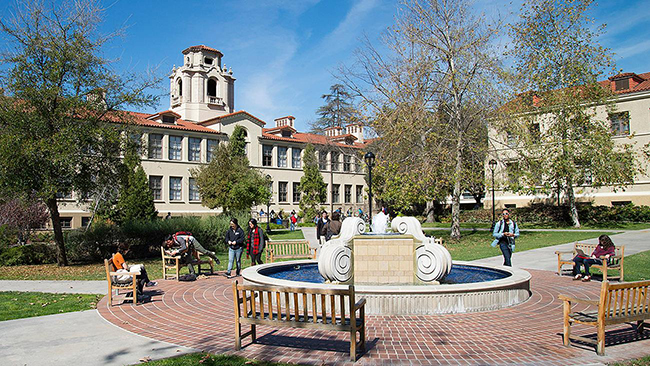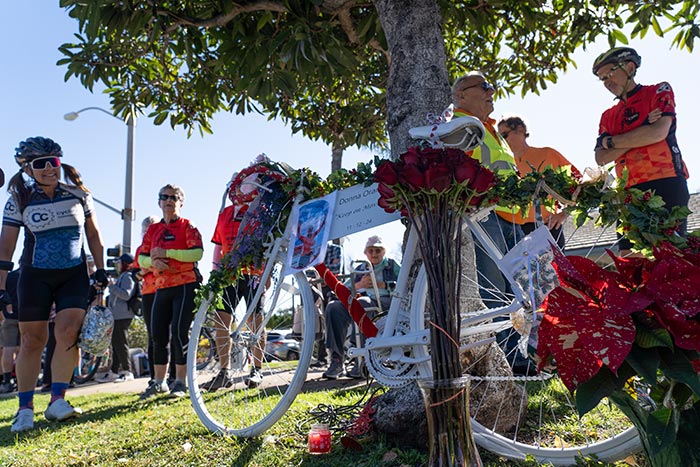Claremont students protest decision in Ferguson
Students from the Claremont Colleges took to the streets in solidarity on Tuesday during a march in protest of a decision not to indict a Ferguson, Missouri police officer for the shooting death of an unarmed black teen.
The peaceful demonstration was just one of many held around the country in response to the grand jury’s finding that there was no probable cause to indict officer Darren Wilson, who shot and killed 18-year-old Michael Brown on August 9, 2014.
Claremont students, faculty and community members were invited via Facebook and word-of-mouth to meet in front of the Claremont Colleges’ Honnold Mudd Library, where they made signs and spoke of the significance of the event. Many of those students peacefully left class to join their peers as they marched through the colleges and the Village, chanting ”Hands up, don’t shoot” before assembling at Claremont City Hall.
Emily Carpenter, a Pomona College sophomore, was one of more than a dozen students who spoke before the large crowd outside city hall, sharing her grief and searching for a space to heal. The words spoken by the 20-year-old were poignant and resonated with the more than 400 people gathered before barricades and a handful of police at the building’s entrance.
“My heart is very, very heavy. I am so exhausted. I’ve been crying every day,” said Ms. Carpenter as she stood before the crowd. “I cry because I know that I have to tell my son or daughter that they don’t matter in this country, that they can be shot and the police officer will be let off. I cry because we have to be walked up and down, like cattle. I cry because they are afraid to let us walk down the street and really show our anger. I cry because we have to protect the f**king property of Claremont. I cry because we have to wait for the police to tell us when to talk and not to talk, when to walk and when not to walk, when to mourn and when to grieve, and how to grieve and how long we’re allowed to grieve.
“We’re constantly told to get over it,”?she continued. “At campus, get over it…go to class, read your books, do what you have to do, you’re lucky to be here. You’re black, you’re lucky to be here. I feel that. Something has to change…”
The Office of Black Student Affairs (OBSA) at the Claremont University Consortium is a student cultural center that offers many services to students of the Claremont Colleges, one of which is supporting and enhancing the wellbeing of undergraduate and graduate students of African descent.
Jon Gary, acting assistant dean of the OBSA, was present at city hall and served as support for the students during the demonstration.
“That wasn’t a speech, she was just talking from her heart,” said Mr. Gary of Ms. Carpenter. “That was unrehearsed. That was her.”
City Manager Tony Ramos stood alongside Claremont police just outside the main entrance to city hall. In a town that values public opinion, he wasn’t surprised by the peaceful demonstration.
“This is the fabric of our community, that these individuals are allowed in a community like Claremont to be able to have their voice be heard. Whether you agree or disagree with the verdict, it’s their right.”
Following city hall, protestors marched down Bonita Avenue, escorted by Campus Safety, to the Claremont Police Station where they held stage for about an hour. People of all colors and backgrounds spoke passionately about the movement and snapped in unison to support those who shared their stories.
Justin Dixon, a 31-year-old Pitzer College student, participated in Tuesday’s demonstration upon request from organizers who were looking for creative ways to spread the word.
“We wanted to set a tone with certain actions to help everyone stay focused, to send their message with peace being used as an example of how to govern the masses,” explained Mr. Dixon.
“This implicates all of us. It’s not just the colleges that need great diversity, it’s also the city and quite frankly the upper-class. Without this type of balance, it’s going to be very difficult to convince people with this disposition,” he says. “If a police state is implemented, it’s going to be everyone’s problem and nobody wants that.”
This isn’t the first time Claremonters have rallied in response to claims of a racially-charged police shooting.
In January 1999, two Claremont police officers fatally wounded 18-year-old Irvin Landrum Jr., who was shot three times in the neck, chest and ankle during a routine traffic stop. One of the officers involved told the investigators the shooting was in self-defense after Mr. Landrum pulled a .45 caliber pistol from his waistband and fired first. However, a subsequent investigation by the Los Angeles County Sheriff’s Department showed that the gun the teen allegedly used was never fired and bore no fingerprints.
“I was 16 when Irvin Landrum Jr. was shot on Base Line Road,” said Mr. Dixon, a Claremont native. “This African-American male was shot and killed in my own community. There were many shots fired. There was some peculiar details about the evidence.”
An independent investigation of the shooting by the LA County Sheriff’s Department and subsequent review by the LA County District Attorney found no evidence of criminal wrongdoing by the two Claremont officers.
“As an African-American male, I do feel uncomfortable around police, regardless of what I’ve done,” says Mr. Dixon. “It makes sense that [the police] would want to approach every situation like their life is on the line, but that is not always the case. There’s a propensity to be intimidated by a black male. These officers come off as being defensive. There needs to be accountability somewhere.”
The purpose of Tuesday’s march in Claremont was to engage students and the community in a “peace action” and generate awareness of what is happening in Ferguson.
Racial divide extends beyond Ferguson, and the African-American community.
According to Mr. Dixon, it’s a major comment on how our civil rights are “a gross misinterpretation of the law” and becoming lethal—for people of all colors.
“I want the police to feel these movements were effective,” Mr. Dixon said. “I want them to think twice before they pull the trigger, not try to sweep under the rug the life of another person who is part of a community.”
The Claremont Colleges has an extensive system available to students seeking support following the Ferguson grand jury decision. The OBSA, Chicano/Latino Affairs, the Inter-faith Chaplains Office, Monsour Counseling and Psychological Services as well as faculty and staff from each of the colleges are available.
—Angela Bailey
news@claremont-courier.com










0 Comments